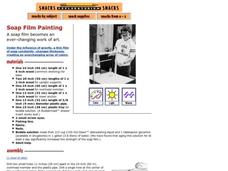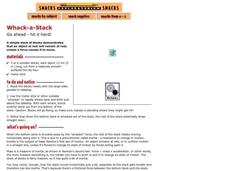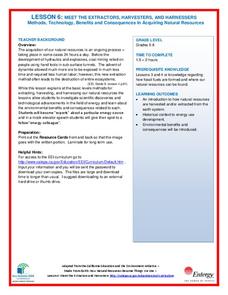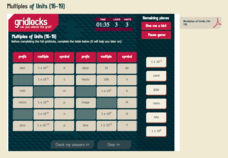Institute of Electrical and Electronics Engineers
Build a Big Wheel
What does it take to prepare for a construction project? In an engineering instructional activity, youngsters examine how a Ferris wheel can turn and carry a load without falling apart. After reading up on big wheel designs, they create...
GiggleUp Kids
Happy Little Farmer
Pre-readers and primaries can help farmer rabbit to plant some delicious fruits and vegetables. From soil preparation and pest control, all the way to the harvest, little ones participate in the entire process!
Scholastic
Study Jams! Scientific Methods
Middle school scientists learn the steps of the scientific method by watching this phenomenal film and by singing a karaoke song! They are introduced to making observations and hypotheses, determining variables, data collection, and...
Baylor College
A System of Transport
Anatomy and physiology fans imitate how blood flows from place to place in the circulatory system. After constructing and calibrating their own measurement cups, learners discover that different sizes of vessels transport various volumes...
Institute of Electrical and Electronics Engineers
Fun with Speedboats!
After reading about marine engineers and naval architects, it's all hands on deck to design and test a speed boat. This lesson is designed for the Next Generation Science Standards in engineering and can be a centerpiece for a STEM...
California Academy of Science
Earthquakes and Tectonic Plates
Here is a comprehensive package in which middle schoolers learn about types of seismic waves, triangulation, and tectonic plate boundaries. Complete vocabulary, colorful maps, and a worksheet are included via links on the webpage. You...
CPO Science
The Periodic Table
Here is a six-page exploration that will spark interest in the periodic table of elements. After reading a diagram-supported explanation of the periodic table's organization, pupils answer questions to familiarize themselves with it. To...
National Science Teachers Association
Monovalent Polyvalent
Which compounds have only one valence bond, and which have two? Chemistry classes sort cards into groups of monovalent and polyvalent piles, according to their bonds. There are 20 cards to identify; half of them name the compound, while...
Exploratorium
Geyser
Although it requires a little extra preparation the first time you use this geyser demonstration, it can be used repeatedly once it has been constructed. This demonstration is useful in showcasing how heat leads to increased pressure and...
Exploratorium
Soap Film Painting
If you are up for constructing a wooden frame, you can do this demonstration of the interference patterns when light reflects off of layers of soapy film. Both constructive and destructive interference can be seen as evidenced by the...
Exploratorium
Whack-a-Stack
Go wild as you hit a stack of wooden blocks to demonstrate Newton's first and second laws of motion. The blocks at the top of the stack stay put as you knock one at a time out of the bottom. Note, however, that you will need to visit a...
Exploratorium
Marshmallow Puff Tube
Let physical science stars experience Newton's first law of motion by blowing marshmallows out of cardboard tubes! Using different lengths of tubing, they find that more force is needed to overcome increasing friction, and they have a...
Polytechnic Institute of NYU
Potential vs. Kinetic Energy
Legos in science class? Watch your pupils fall in love with this activity. After learning to measure potential and kinetic energy, young scientists create their own ramps using Lego Mindstorm sensors and software.
Curated OER
More on Conduction and Convection
Why do some items feel colder when they are the same temperature? How should you keep your soda cold? What makes the wind blow? These are just some of the things middle schoolers discover when completing a lesson plan on conduction and...
American Chemical Society
The Ups and Downs of Thermometers
What has a thermometer earned that your pupils haven't? A degree! After reviewing the previous lessons about molecules and degrees, scholars observe how thermometers work before building their own. The module includes a activity sheet.
National Wildlife Federation
Meet the Extractors, Harvesters, and Harnessers: Methods, Technology, Benefits and Consequences in Acquiring Natural Resources
There are advantages and disadvantages to all sources of energy; the trick is determining which one has the least impact! Part six in the series of 12 has learners further explore energy resources. After reading information about one of...
Polar Trec
Where is the World's Water?
Scholars discover the amount of the Earth's water in various locations such as the ocean, ice, the atmosphere, etc. They then make a model of the how much water those percentages represent. Finally, analysis questions bring the concepts...
Royal Society of Chemistry
Naming Esters
Do your chemistry scholars know their esters? Introduce the class to the nomenclature and structural formulas of common esters through thought-provoking games. Individuals or pairs of pupils match the name with the formula before using...
Royal Society of Chemistry
Electronegativity Values
Finally, an electronegativity resource your class will be strangely drawn to! Skilled scientists manipulate interactive puzzles to gain an understanding of common electronegativity values. The great thing? You can conduct the lesson...
Royal Society of Chemistry
Multiples of Units (16-19)
It's a parade of prefixes! Chemistry scholars identify common prefixes used throughout the sciences using an interactive puzzle series. Learners solve puzzles by pairing the prefixes with the power of ten they represent.
Royal Society of Chemistry
Tests for Anions
The anode, the positive electrode, attracts negative charges, which is why we call negatively charged atoms anions. The interactive allows pupils to match six different anions to the associated properties when testing. Offering four...
Nuffield Foundation
Assessing Human Hearing
Young scientists explore hearing through multiple experiments, demonstrations, and activities. They focus on the changes in hearing over a lifetime, how we can determine where a sound is coming from, and the ability to filter noises.
Kenan Fellows
What Is Heat?
If objects have no heat, how do they can gain and lose it? Scholars experiment with heat, temperature, and specific heat of various substances. They create definitions for these terms based on their own conclusions to complete the fourth...
Center for Technology in Teaching and Learning
CSI: The Experience - Family Forensics
Forensic scientists depend on their observation skills to analyze evidence down to the molecular level. Middle and high schoolers practice making observations and predictions with a series of crime scene activities, which includes a...
Other popular searches
- Memorization Techniques
- Multiplication Memorization
- Memorization Skills
- Memorization Teaching Method
- Spelling Word Memorization
- Memorization Games
- Memorization Science
- Memorization Tips
- Math Fact Memorization
- Memorization Tricks
- Word Families , Memorization
























